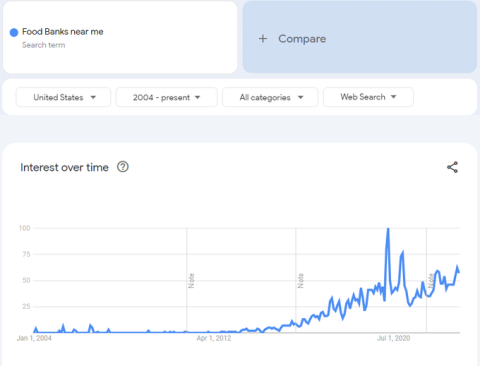such a great economy
I've written here at least once over the years that I think GDP is a bad measure of the condition of an economy. I think the GINI coefficient needs to be included in any measure of national health. Maybe you can understand my frustration when, year after year, we see president after president get up for a State Of The Union address and declare that the USA is "strong".
I've been saying at least since the Occupy movement that things are bad and getting worse. I know I sound foolishly unrealistic when I say it, given all the politicians and newspapers and journals who say otherwise. Consider, though, this chart that was brought to my attention on Reddit. I decided to check the validity of it. I went directly to Google to generate the same graph. It shows how often people in the USA search Google with the phrase "food banks near me", from 2004 to 2023.
Somebody needs to explain to me how things can be so bad and can continue getting worse for so long, yet "the system" keeps telling us that everything is alright.
I don't see how any of this can continue. Please, explain it to me like I'm stupid, because it doesn't make any sense to me. If I'm wrong, then I'm wrong, but I need to understand why I'm wrong.

no subject
Any one number isn't going to properly measure a complex system. Even if we did have a good measure, and we make it a target it improve, it stops being a good measure, because the powerful find it easier to play with the numbers than to actually improve things.
https://en.wikipedia.org/wiki/Goodhart%27s_law
no subject
https://knopp.substack.com/p/impeding-collapse
I think I agree with the gist of it, and the prediction. A quote from the Occupy movement still seems applicable: "The beginning is near." I'm hopeful about what comes next, but I grow increasingly pessimistic about how much of the human population will survive past the transition.
no subject
Also, statistics the art of comparing apples to oranges depending on whether you need votes in Washington State or Florida. Evidenced-based policy-making is picking the preconceived notion of what outcome is desirable, and arranging the measures and policies favorably.
Throw in a dash of Campbell's Law, and draw attention to the drop in new unemployment claims.
https://en.wikipedia.org/wiki/Campbell%27s_law
no subject
https://www.npr.org/2023/08/06/1192388445/grocery-stores-are-trying-to-protect-ice-creams-from-getting-stolen-off-their-sh
It seems to me that we're long past time to try something to turn the course of this unfolding disaster. I can't fathom why so many people are unwilling to try. Cue yet another election in a long chain of elections spanning decades where we are told that we simply MUSTN'T vote for a progressive candidate, or else things might get bad.
no subject
no subject
no subject
no subject
no subject
no subject
no subject
This was the group doing it.
no subject
An unacknowledged political decision is that we get reports on totals and averages, only. If plenty of resources exist, it is a point of ideology that that *must* be success, because a good and just system like ours *must* be distributing resources fairly and survivably.
But in actuality, the distribution of resources has been getting worse for decades. After the last two recessions, approximately ALL of the 'recovery' went to the richest part of our population. Approximately NONE of it went to the vast majority of regular people. Which is why we experience and observe that things are hard, while being told that things are fine.
TL/DR: The things are fine, but we don't get them. Billionaires are hogging all the things.